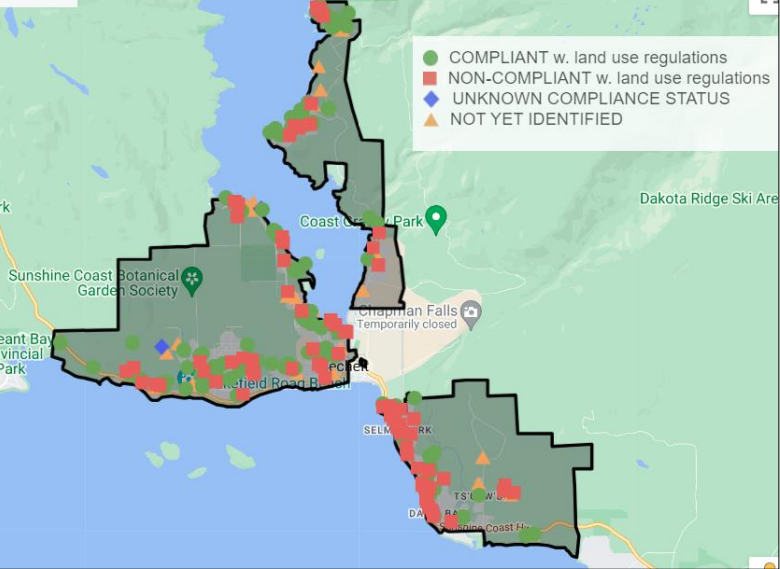Sechelt has recently endorsed recommendations on short-term rentals (STR) to align their regulations with new Provincial legislation – which will mean that no more applications for Type 3 STRs will be considered.
These changes follow decisions made by the Provincial government to prohibit short-term rentals within non-principal dwellings and the removal of the lawful non-conforming residency status, which will come into effect May 2024.
During the Committee of the Whole meeting on Nov. 8, Andrew Allen, Sechelt’s Director of Planning and Development explained, “What we call Type 3 rentals, the Province is effectively saying is no longer permitted use in municipalities in British Columbia, other than resort municipalities or areas with a greater than three per cent vacancy rate, which choose to apply to the Province to be exempt.”
The proposed changes were put forward to the committee in order to pave the way for coming provincial legislation, and to shift the short-term rental focus on the Coast to Types 1 (principal residence) and 2 (self-contained suite on principal residence).
Coun. Adam Shepherd spoke in favour of the changes, and asked for more information on compliance in Sechelt.
Allen responded that general compliance with Type 1 and 2 rentals has been high, but that Type 3 rentals were more difficult, saying that some lawful non-conforming residents that were approved for temporary use permits (TUP) did not come forward to apply for a business licence.
Coun. Alton Toth pointed out a discrepancy between the number of business licences approved for Type 3 rentals versus the amount of licence revenue recorded.
Staff responded that a variety of circumstances that are difficult to summarize are responsible for this, one reason being that some applicants do not follow up with the business licence application once they receive a non-conforming acknowledgement.
Coun. Dianne McLauchlan mentioned the number of pending Type 2 STRs, asking how long it takes for an application to be accepted.
Allen answered that when they receive a completed application, it is typically issued within two weeks.
Coun. Shepherd asked of the tickets issued for STR infractions, and how much of that amount has actually been paid to the district.
Staff answered that the number of tickets issued was unknown, but clarified that the District of Sechelt has issued $25,400 in STR fines and that they expect 100 per cent of that will be collected.
Coun. McLauchlan asked for clarification if there would be a limit to how many rental suites are allowed within one residence.
“Presently our bylaw for a Type 2 licence separate suites in the principal residence or external to the principal residence allow up to a maximum of two,” Allen answered. “The Province’s Short Term Rental Accommodation Act will allow one in the principal residence and one in a suite or accessory dwelling unit. So still two units but one will need to be in the main house which is a little less flexible than the current system.”
Mayor John Henderson raised the point that one of the district's primary goals is converting short-term rentals into long-term rentals, and asked how many long term rentals have been created due to newly implemented regulations. As of Nov. 8, 24 long-term rentals have been created as a result of their enforcement program, Allen said.
Coun. McLauchlan said, “I am still wanting to highlight that STRs are the commoditization of housing. People say they've made an investment and they want to run a business but the fact is, we need housing for people that live here that need to live here. We need to think about the trade-offs being made.”
She added, “We want to build more housing, but the best housing to provide for people is the housing we already have.”
Coun. Shepherd asked for clarification on the types of complaints the district receives about STRs. Allen answered that general complaints centre around noise, parking and direct impacts on the surrounding neighbourhood.
Henderson said these changes are “fairly anticipatory” of coming provincial legislation, advising that council didn’t have to move too quickly on these recommendations. “I think that inevitably there will be changes to the potential legislation, I would just like us to see how things go in the coming months.
“I really, really feel that we need an update for the report before us to answer some of the questions that we've raised here today,” Henderson said. “So for that reason, I don't feel inclined to support the motion.”
Coun. Toth commented that the rural areas of the Sunshine Coast already prohibit secondary residence STRs, “We're sort of last to the game, if you will.”
The motion was endorsed with no additional recommendations, and only Mayor Henderson opposed. Early in the new year, the proposed amendments to the STR bylaw will be presented in a council meeting for a final reading before they are officially adopted.
Jordan Copp is the Coast Reporter’s civic and Indigenous affairs reporter. This reporting beat is made possible by the Local Journalism Initiative.


